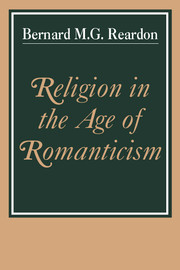Book contents
- Frontmatter
- Contents
- Preface
- 1 Romanticism, idealism and religious belief
- 2 Schleiermacher on the religious consciousness
- 3 Hegel and Christianity
- 4 The idea of God in the philosophy of Schelling
- 5 German Catholic theology in the Romantic era
- 6 Italian ontologism: Gioberti and Rosmini
- 7 Lamennais and Paroles d'un Croyant
- 8 Auguste Comte and the Religion of Humanity
- 9 Ernest Renan and the Religion of Science
- Notes
- Index
4 - The idea of God in the philosophy of Schelling
Published online by Cambridge University Press: 05 June 2012
- Frontmatter
- Contents
- Preface
- 1 Romanticism, idealism and religious belief
- 2 Schleiermacher on the religious consciousness
- 3 Hegel and Christianity
- 4 The idea of God in the philosophy of Schelling
- 5 German Catholic theology in the Romantic era
- 6 Italian ontologism: Gioberti and Rosmini
- 7 Lamennais and Paroles d'un Croyant
- 8 Auguste Comte and the Religion of Humanity
- 9 Ernest Renan and the Religion of Science
- Notes
- Index
Summary
If Hegel was primarily a rationalist and a Romantic only in certain aspects or nuances of his thought, in Schelling, on the contrary, German romanticism found perhaps its most representative voice. Indeed, at the philosophical level it can be claimed for him that he was the most typical Romantic of his age anywhere in Europe. Coleridge certainly owed much to him. Yet for the English-speaking world, despite the familiarity of his name and the aura of intellectual brilliance which sustains his memory, his work has remained comparatively little known. Much the greater part of it is still untranslated and in the original he is, I fancy, seldom actually read. Historically he is associated with Fichte and Hegel, who now overshadow him: Fichte as the inaugurator of post-Kantian idealism, and Hegel as its great consummator, the master in whom it achieved its splendid culmination, but in whom also – in his native Germany at least – it reached its effective end. Metaphysical prodigy though Schelling was – he was appointed to a professorship at Jena at the age of twenty-three, his first notable publication having appeared when he was only twenty – he has left on posterity the impression of having changed his viewpoint rather too often – his work contains some five distinguishable systems – and, for all his speculative insight, to have dabbled in too many matters of which his knowledge was no more than sketchy.
- Type
- Chapter
- Information
- Religion in the Age of RomanticismStudies in Early Nineteenth-Century Thought, pp. 88 - 116Publisher: Cambridge University PressPrint publication year: 1985



